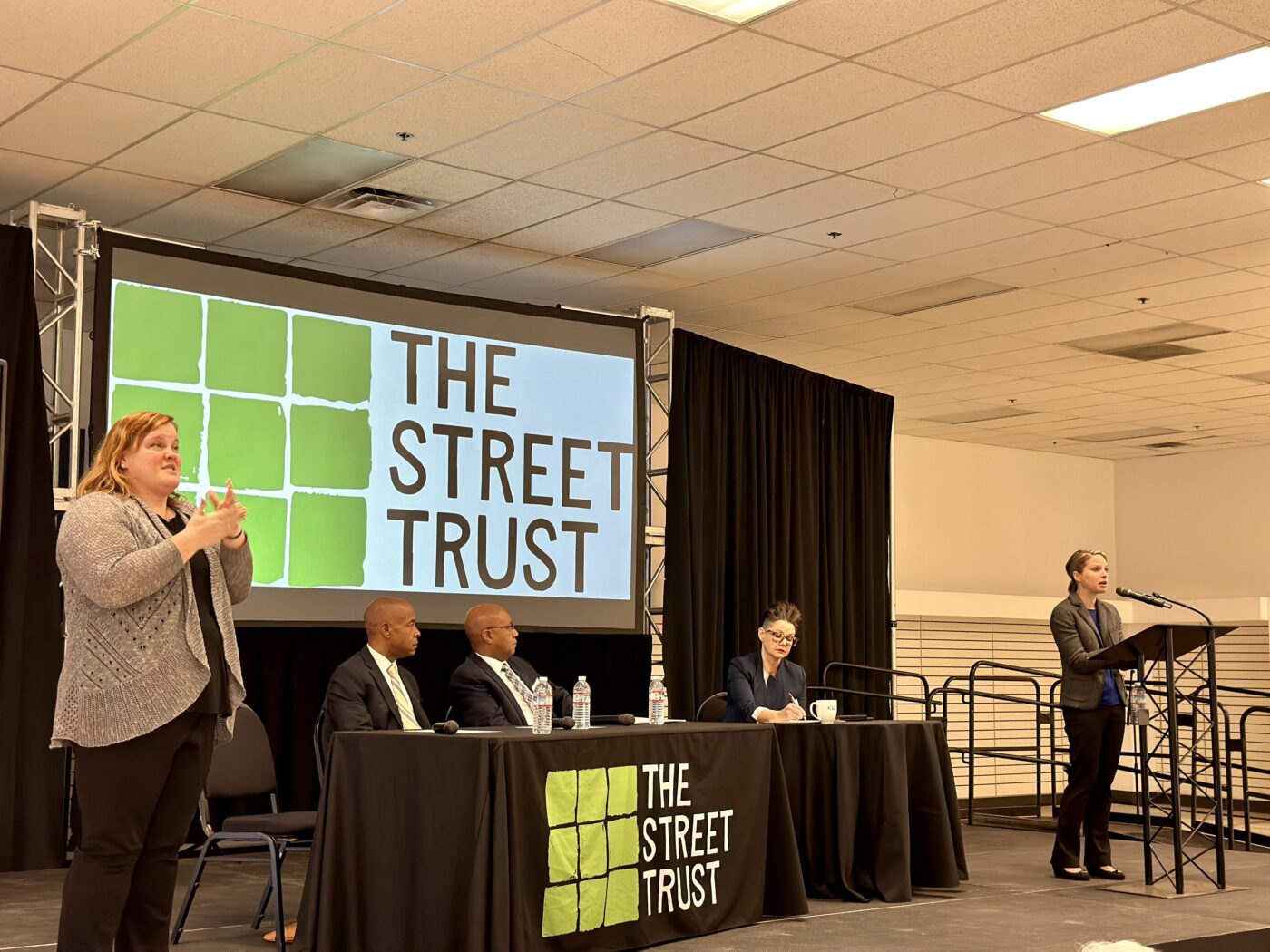
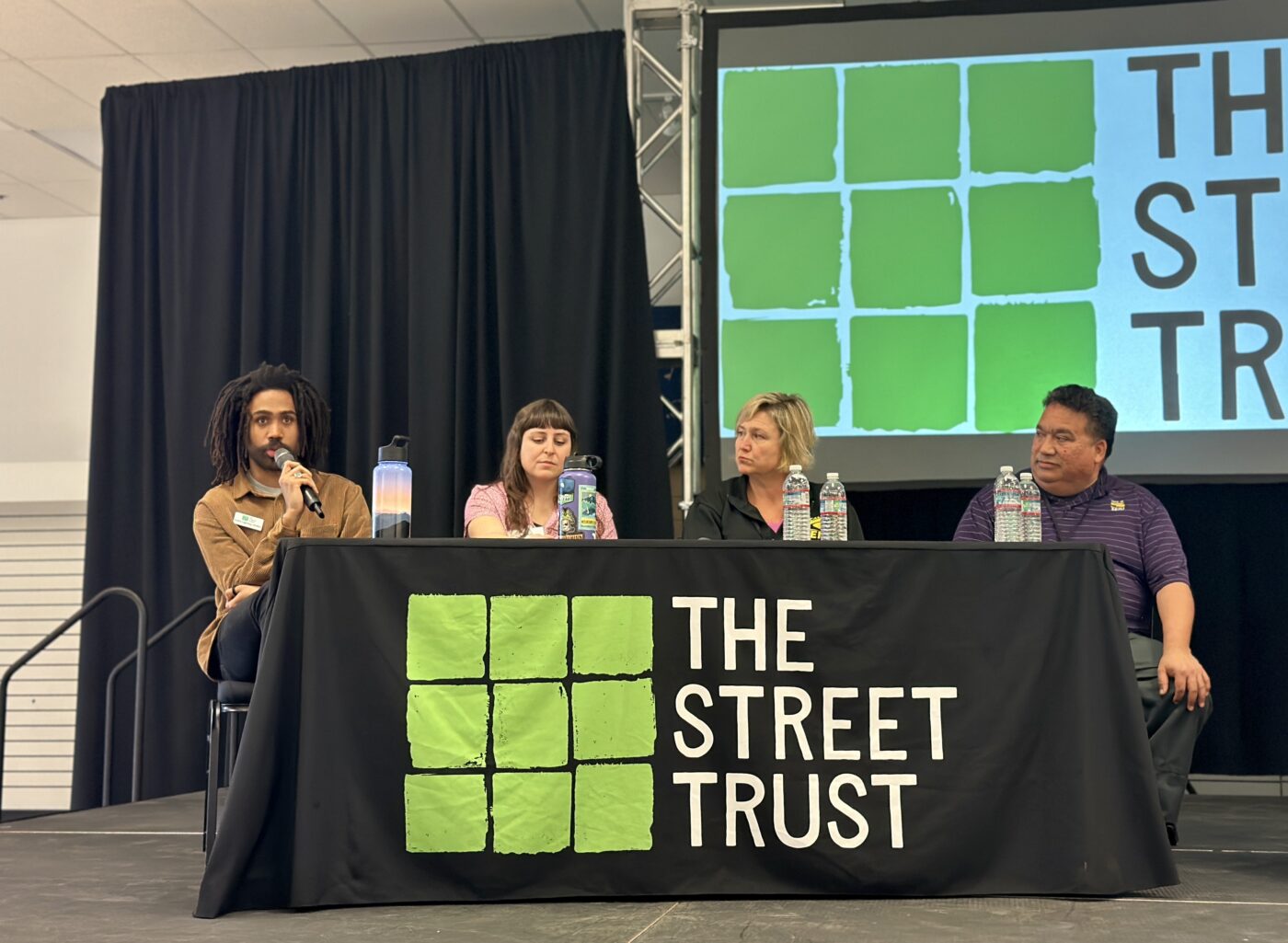
Most Portlanders are probably familiar with some of the issues regional public transit agency TriMet has been dealing with lately: ridership declines, dire operator shortages, public safety concerns and budget issues — all of which agency leaders hope to solve with a controversial fare hike. Turns out, other transit services across the state (and beyond) are facing similar challenges.
On Monday at the 2023 Oregon Active Transportation Summit (hosted by The Street Trust at Lloyd Center Mall) attendees heard from both transit agency leaders who manage systems from a high level, and the community advocates who see how people experience these services. Both perspectives are important for understanding the current state of public transit and where it will go from here.
Executive Director of The Street Trust (TST) Sarah Iannarone served as the moderator for the first panel of transit agency leaders. She said TST has been “thinking multimodal for quite some time now” (moving beyond its former name of Bicycle Transportation Alliance) and they wanted to hold a conversation about Oregon’s evolving public transit systems.
“Transit is in a dynamic state right now. It needs our support,” Iannarone said.
The first panel consisted of three transit agency leaders from across Oregon: Sam Desue, Jr., who leads TriMet; Lane Transit District (LTD) General Manager Jameson T. Auten; and Andrea Breault from Cascades East Transit in central Oregon. Each provided a different perspective on what it’s like to run a transit agency in their distinct part of the state.
Following their panel conversation, we heard from a group of four transportation advocates: The Street Trust Planning and Policy Manager André Lightsey-Walker; Better Eugene-Springfield Transportation (BEST) Program Manager Claire Roth; and SEUI Local 49′s Meg Niemi and Renato Quintero. Moderated by Josh Laurente from OPAL Environmental Justice Oregon, these four people brought unique insights on a range of subjects, and it was especially interesting to hear their thoughts in relation to what the agency leaders had to say.
The pandemic’s impact
“I was afraid to ride transit from a Covid perspective. That pushed me, a daily transit commuter, away from using our transit system.”
– André Lightsey-Walker, The Street Trust
Many of the problems currently impacting public transit agencies were present even before the pandemic hit a little more than three years ago. But Covid certainly exacerbated these issues, forcing agency leaders to rethink their operations and make some big changes.
“Everything changed during the pandemic for TriMet,” Desue, Jr. said. “One thing that was vital to us was making sure that transit continued to roll to get our emergency workers and our transit-dependent personnel to appointments and services.”
Because of the shift to remote work during the pandemic, peak ridership hours evolved. TriMet had to figure out their riders’ new schedules and has recently moved to accommodate those changes.
But it wasn’t just remote work that kept people off of public transit during the pandemic. Many former passengers — and operators — were now afraid of being in an enclosed box with strangers who could infect them with a deadly virus. While this fear is understandable, some transit advocates think it was harmful to spread the message that being on a bus was any more dangerous than being anywhere else in public, and some riders may never return to the public transportation system because of it.
During their discussion, advocates talked about how the pandemic impacted their own ridership and what they saw from others.
“I was afraid to ride transit from a Covid perspective,” Lightsey-Walker said. “That actually pushed me, a daily transit commuter, away from using our transit system.” Lightsey-Walker said he switched to using Biketown instead, which he felt was a safer option in the midst of the pandemic. (Considering Biketown’s success in the last couple of years, it looks like lots of people agreed with him.)
Auten said that LTD has begun working with local bike and scooter share programs in Eugene and Springfield to accommodate this shift toward other modes of transit.
“We’re starting to figure out how all these pieces connect,” he said.
Public safety
Public safety is a very hot topic within the transit conversation, but the discussion is often narrowly focused on only one idea of what public safety is. In Portland, people often mention the prevalence of people on public transit who may be experiencing mental health crises or even using drugs on the MAX. These concerns are real, but there are other public safety problems related to transit that are often neglected.
“Safety is subjective and the things that make people feel unsafe are different,” Lightsey-Walker said during the community advocate panel.
Lightsey-Walker recounted the story of when he felt most at risk while using public transit.
“If you didn’t realize, I’m a young Black man in Portland, Oregon. So you may have an idea of where safety concerns actually emerge for me,” he said. “The most scared I’ve ever been in a transit situation was actually being followed by an officer…having an encounter with a individual who has the ability to shoot me on site is a pretty jarring experience and, and certainly more scary than any situation I’ve ever experienced riding the bus with someone have a mental health issue.”
In the past few years, TriMet has started a program to move toward an approach to security based in conflict resolution instead of retribution. Some armed officers have been replaced with people trained in mediation and crisis management. But this isn’t the only safety concern keeping people away from riding transit.
Meg Niemi is a union rep and a safe streets advocate in Portland. She said she thinks public safety on transit encompasses many different things, including the ability for people to walk to the bus stop without the threat of traffic violence and to be able to get on their bus or train quickly so they don’t have to wait a long time in dark, isolated areas.
Niemi said two members of SEIU Local 49 have been killed in traffic crashes while trying to get to the bus.
“I think the issue of safety is is multifaceted… there are a lot of issues that need to be addressed around safety to make all of us feel safer using public transit and other modes of of transportation besides cars,” Niemi said. “We have to work together to make it so people are who are walking and biking feel safe getting to and from transit.”
There have been some incidents in the past few years where TriMet bus drivers were assaulted by passengers. These occurrences — and TriMet’s apparent lackluster response to them — are a reason some employees said there was a staffing shortage within the agency.
But TriMet has made changes to protect their operators, installing glass shields on buses to protect bus drivers from assault and changing their rules on long-term exclusions for passengers who commit misdemeanors while riding TriMet. Evidently, these measures have been effective, because TriMet has largely been able to overcome its staffing woes.
The future for public transit
“The freedom to choose mobility options belongs to the people and transportation is a human right. The privileged vocal opposition can’t take that away from us.”
– Claire Roth, Better Eugene-Springfield Transportation
What do transit leaders and advocates expect — or want — the future of public transit to look like?
Auten brought up a point that is often overlooked in conversations about public transit — that maybe ridership data isn’t everything.
“Ridership is an important indicator, don’t get me wrong, but it’s not the only one,” Auten said. He said he wants to direct LTD to look at other outcomes as well, like whether or not people are able to get where they need to go on public transit. “I think it’s important for us to… understand how our public is using us and how we need to change and make sure that we have real mobility options.”
During the second panel, BEST’s Claire Roth added to this point.
“Opposition claims that empty buses mean that people are not riding transit. We know that that’s not true, or else I would use the same argument when I see empty streets and I would say ‘Well, people aren’t driving cars,'” Roth said. “The freedom to choose mobility options belongs to the people and transportation is a human right. The privileged vocal opposition can’t take that away from us.”
Roth is familiar with this vocal opposition to bus service — she and other local advocates have been fighting back against a group of people who were so upset about a proposed bus rapid transit project in Eugene that they led a successful campaign to oust a pro-transit city councilor. To Auten, this was a learning experience about public engagement strategy.
“We have to assess how people are receiving information now. How are we gathering that information and turning that into decision-making and then communicating what comes out of that?” Auten said. “As we [study our engagement strategy], I think we’ll learn that what our public really needs us to be, not what we want to be.”
Auten said serving such an engaged community can be a double-edged sword, but it’s better than the alternative of being part of a community that’s indifferent to change.
“I like to joke that I can’t order a ham sandwich without going to five different councils or committees…but the opposite [would be] worse,” he said. “We have an engaged community that we’re going to work with.”
And even if public transit isn’t your primary focus when it comes to transportation advocacy, Roth said a well-functioning public transit system is crucial to the entire transportation ecosystem.
“If we see a transit system that’s working well that means we should also see pedestrian and bicycle networks working well,” Roth said. “Transit doesn’t just serve people who take transit. It serves everyone. And honestly, transportation is a human right.”



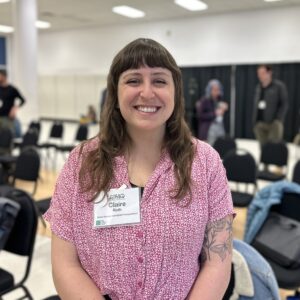
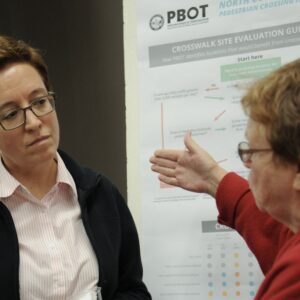
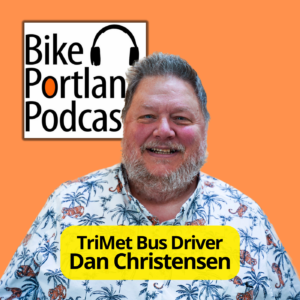

Thanks for reading.
BikePortland has served this community with independent community journalism since 2005. We rely on subscriptions from readers like you to survive. Your financial support is vital in keeping this valuable resource alive and well.
Please subscribe today to strengthen and expand our work.
I’ve noticed the TriMet safety response teams around, and I would really like to see more of this, especially on the transit mall. The teams almost always number 4-6, and include mostly young-looking, unarmed people chatting and walking around together. (I would have loved to have this as a part-time job in my early 20s or even in college!) While most of the streets around Old Town have improved significantly, multiple safety teams on the transit mall would be a welcome sight, especially around the train station where tourists are making connections. They don’t need to hassle anyone about fares or whatever. Just provide a group of people who can make riders feel comfortable at stops/stations (safety in numbers), intervene in extreme circumstances or distract jerks who harass people waiting for their train/bus. In emergencies, I can see them making a real difference. I appreciate that more of these teams means more money from TriMet, but it seems worth it in the long run if it makes people more comfortable waiting for the train/bus, and therefore more comfortable riding transit.
My biggest and only beef with bus routes is that they universally take longer than riding my bike in Portland. So, what would get me to take the bus more often? Faster, more frequent service, which will lead to the emptier bus problem. Making it harder to park would probably do it, too. On those days when it’s pouring and I don’t feel like carrying all my rain gear around on a trip to Alberta or Division or Hawthorne, I would probably take the bus if I knew parking would be more of a headache than it already is. Let’s meter parking more aggressively in residential areas around these commercial corridors like they do around NW 23rd.
Smarter people than me can try to solve these quandaries, I guess, but what frustrates me most is the lack of political will to just try any of the large number of proposed policy/strategy changes. No one seems to want to just try anything for 6 months or a year. All I want to see are my tax dollars being used to at least TRY to improve the transit situation. It’s encouraging that the city is adding bikes to the Biketown fleet. I’d love to see Mapps get a metered parking pilot going around Division now that it has the new bus lane. It would be great if TriMet stepped up and actually tried something new with that fare hike income.
Thanks for this comment. I agree completely with your points especially in the last paragraph, there is no political will to just TRY something. Actually there is, at least on occasion, like the TriMet safety response teams you mentioned which seems like a great success. They just need to do more of it.
I’d also add that I want to see more aggressive deterrents to cut through traffic on side streets. They’ve done it in some places so we know it’s possible, lets just see more of it!
This is important to point out because one common thing I see is when a lay person points out some pretty convincing proof of concept (e.g. the safety response teams), it’s treated as if this is some final policy proposal ready to implement. It’s not your (or my) job to figure out all the nitty gritty details, but it is within our ability to simply notice that there is probably a pretty straight forward solution that isn’t being acted on.
This whole “cops are more dangerous than violent people in a drug induced mental heath crisis” thing really needs to stop guiding our public policy on safety. It’s not helpful and it’s a distraction from the tough actions we need to take, to take our city back from the meth zombies. People want to feel safe again. I’m sorry that cop makes you feel uncomfortable, but the rest of us just want not to get stabbed by the tweaker screaming on the platform with a machete in their hand. Tangible safety, as in reduction of violence, open heavy drug use, and other problem behavior should be the focus if you want people to start riding again.
Comment of the week nominee by Jay Cee. Instead of having a serious discussion of safety on transit Lightsey-Walker decides to go on the full ACAB & BLM rant. Stick to the topic! Every transportation discussion doesn’t need to devolve into another ACAB & BLM soapbox moment. It isn’t even remotely linked to the topic of safety of transit users.
I’d like transit to feel safe, but a bunch of racist cops writing people tickets/exclusions because their hop pass didn’t activate properly while doing not much about actual abusive riders like the trimet barbur isn’t going to make our transit system safe. I’d like to see more of an ambassador program, which could put more people on the ground for less money and likely will have a bigger impact.
If I’m going to be unarmed trying to mediate people having drug induced psychosis (I think it’s time to stop calling it a mental health crisis as that’s separate and much rarer) in a confined space like a bus or the MAX I’m going to want to be paid as much if not more than a police officer.
Has anyone been killed by Transit police in Portland? I’m curious, because I can’t recall an incident.
We all know about the high-profile double-murder on MAX a few years back, and there have been a lot of other murders on Trimet:
https://www.oregonlive.com/crime/2021/08/victim-identified-in-tri-met-bus-shooting.html
There have been many violent, near-death incidents:
https://katu.com/news/local/grand-jury-indicts-woman-on-attempted-murder-charge-in-trimet-stabbing
It seems that even black males face significantly more risk from other riders on Trimet, not the police. It’s unfortunate that some might percieve the police as the greater danger, but the data doesn’t support that.
As I recall the max stabber assaulted a black woman the day before and the cops could not be bothered to take action. They easily could have prevented the whole thing but it is easier to just hang back and meet your fare violation quota. Personally I would rather have someone unarmed who was willing to take something like this seriously.
https://www.opb.org/news/article/jeremy-christian-demetria-hester-max-train-attack-portland-police/
We don’t have to accept one form of dangerous violence and fear in order to deal with another form of violence. That’s the complaint. There are other solutions, including bot not limited to the ones discussed in this article and pinned comment.
My guess is that with the discussion being led by someone with strong anti-police views (Sarah Inarone of The Street Trust) no true discussion about public safety on transit will occur at this event. For these activists it’s all about how enforcement is racist instead of realizing people don’t want to get their face chewed off riding the MAX.
Elderly man has part of his face chewed off in Gresham MAX platform attack (kptv.com)
He was not riding the MAX, he was on the MAX platform after it had closed. Horrible story but could have happened anywhere, and I don’t really expect or want Trimet to spend limited budget dollars to police MAX platforms at times when the trains are not running.
While you are technically correct, it is very possible that both of these riders had spent the evening on MAX, and were dumped at the end of the line when service ended. It isn’t a great example to advocate for more transit police, but there are dozens of other incidents that occurred on transit during service hours that would be.
Frankly the “it could have happened anywhere” or “it’s like this everywhere” excuses for Portland area crime are getting tiring.
And does it really matter if your face gets chewed on the train or on the platform? Seriously.
The transit mall and the transit corridor through Downtown on Yamhill and Taylor are so sketchy! So much open drug use and selling drugs, brandishing knives, and erratic behavior of people experiencing a mental health crisis or a drug-induced crisis. If we want a transportation system for everyone, thee transit corridors need to the safest, cleanest places in town. No littering, no smoking anything, no open containers, no public urination/defecation, no sidewalk obstructions. I think it is really dumb to let cars on the transit mall, too. No one should need to press a beg button to access a MAX stop or cross the road to get to a bus stop. Ped signals should be automatic and signals need to change quickly. A lot of this is PBOT problems- closing crosswalks, terrible signal timing, signals that prioritize SOVs over pedestrians or bikes. The Police need to be engaged to a better job of chasing off drug dealers. TriMet security could crack down on littering and smoking.
I love the comments that safety includes being able to safely walk to the bus/train- we need better street designs and car controls!
Sorry but hyperbole like this is not going to increase our transit and/or bike share. Maybe young Black men don’t have any problems with our homeless or mental health population but as a young Asian woman, I have had multiple very scary situations. I no longer use public transit in Portland. Just not worth it.
Who are you to deny other people’s lived experiences? It is entirely possible that yours and his experiences are both valid and do not contradict each other.
It doesn’t sound like she is denying anything, but rather providing a counter-point. The intent of his comment was the throw cold water on the idea of increasing transit police presence to help increase public safety on our transit system. How do we make transit safer for vulnerable people in our society? I didn’t see a follow-up quote above with any proposed solutions from the young man above. Maybe he has other ideas?
André is talking about his own personal experience, and his fears can be backed up by all of the terrible instances where unarmed Black people have been killed by police. His comment does not invalidate your experience. It’s far from hyperbole for a Black man to be scared of being followed by an officer.
101 people were murdered in Portland last year, over 50 were African American in a city that has a 6% black population.
A complete failure and travesty.
Andre has more to worry about than police, sorry.
Sad to say that there are a lot of armed people out there who can shoot you on sight, and our murder rate attests to the fact that far too many do. The chances of someone being shot by the police are much smaller than by a civilian in their own community. It may feel unsettling to interact with a visibly armed person, but we all interact with far more people carrying concealed weapons every day, most of them with much less training than a cop has.
Welcome to America.
I take “has the ability to shoot me on si[ght]” to mean the ability to not face any consequences for it. Their word is all that’s needed. It’s trivial to say anyone can have a gun, everyone knows that.
Even if someone randomly shoots you on the street, there’s a less (probably much less) than 50-50 chance they’ll suffer any consequences. Not that it matters much if you’re dead.
Statistically speaking, if you do get shot, it wasn’t a cop who did it. And if it was, at least your family will know who to sue.
Author: Kyle Iboshi (KGW)
Published: 6:37 PM PST December 26, 2022-
“Despite a record number of homicides in Portland this year, detectives are solving a higher percentage of those cases, according to newly released data. As of Dec. 16, Portland’s homicide clearance rate for 2022 was 53%, up from 48% last year.”
Great guesstimate Watts! At least for 2022 you’re spot on. You made me curious and I was thinking the 50/50 was too high of a success rate, but it’s just right.
By Jonathan Levinson (OPB)
Jan. 2, 2023 6 a.m
“In Portland, police officers shot at nine people in 2022, killing four and injuring three.”
I don’t know if any of the 4 were unarmed, running away, guilty, innocent or what, but 4 dead is a lot less than 101 dead as mentioned by DWK earlier.
I find it interesting that I don’t see ATU 757 engaged in this Active Transportation Summit conversation. I would think that the body that represents the people that ACTUALLY OPERATES Trimet and LTD would have been fully engaged in this conversation.
My son-in-law is African American and a 15 year TRIMET bus driver.
No reason to include them in this summit. No life experience.
His biggest fear in his work environment is not the Police, I guarantee.
If you think I am making this up, JM, can contact me. BP could interview a real bus driver.
Nah, Bike Portland wouldn’t like “that kind” of lived experience. It seems only “lived experiences” that cry racism are elevated in Portland.
He sounds like a great subject for an interview. The self appointed transportation leadership is stunningly unaware of the real world for those who aren’t able to work from home and I would love to hear from someone who has such a broad spread of time “in the trenches “
No, Bike Portland would never interview a real bus driver. Never happen.
This was heartbreaking to read. If these vapid, non profit working, not needing to spend several hours one way on the MAX because they simply can’t afford the first/last for a place closer to work people are considered our transportation leadership then I don’t expect any change.
This statement really drove it home for me,
“Auten said serving such an engaged community can be a double-edged sword, but it’s better than the alternative of being part of a community that’s indifferent to change.
I like to joke that I can’t order a ham sandwich without going to five different councils or committees…but the opposite [would be] worse,” he said. “We have an engaged community that we’re going to work with.”
It’s all just fun and games for our literally self appointed leadership. Going to these meetings and committees is how they pass their time and gives them a sense of purpose, it just doesn’t help the rest of us. The reality of our public transportation speaks a truth they can’t seem to understand.